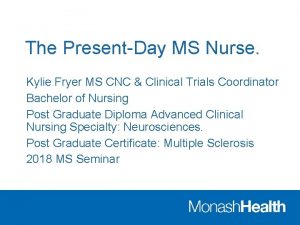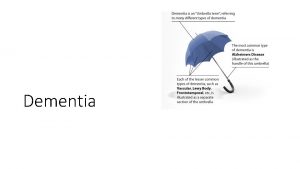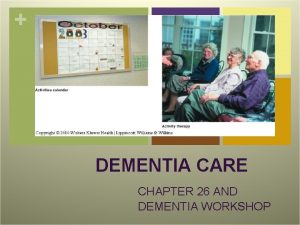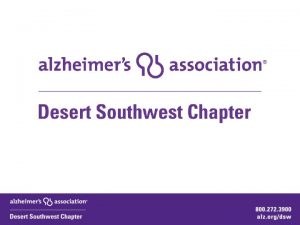Dementia Kylie Park What Is Dementia Dementia is











![Sources • 1. Alzheimer's Disease and Dementia. (2019). What Is Dementia? . [online] https: Sources • 1. Alzheimer's Disease and Dementia. (2019). What Is Dementia? . [online] https:](https://slidetodoc.com/presentation_image_h2/0ecf3ce17cd334673fe0508a89ff5293/image-12.jpg)
- Slides: 12

Dementia Kylie Park

What Is Dementia? • Dementia is a general term for a decline in mental ability severe enough to interfere with daily life. 1. Alzheimer's Disease and Dementia. (2019). What Is Dementia? . [online] https: //www. alz. org/alzheimersdementia/what-is-dementia

What are the Different Kinds of Dementia? Alzheimer’s Disease Vascular Dementia Frontotempor al Dementia 2. Healthline. (2019). Changes in the Brain: 10 Types of Dementia. [online] https: //www. healthline. com/health/typesdementia#alzheimer Dementia with Lewy Bodies Creutzfeldt. Jakob Disease Parkinson’s Disease Mixed Dementia

Kinds of Dementia Cont. • Alzheimer’s Disease- Alzheimer’s disease is characterized by brain cell death. • Vascular Dementia - It’s caused by a lack of blood flow to the brain. • Dementia with Lewy Bodies - is caused by protein deposits in nerve cells. This interrupts chemical messages in the brain and causes memory loss and disorientation. • Parkinson’s Disease – People with Parkinson’s Disease will develop Dementia. Early signs of this type of dementia are problems with and judgment. 2. Healthline. (2019). Changes in the Brain: reasoning 10 Types of Dementia. [online] https: //www. healthline. com/health/typesdementia#alzheimer

Kinds of Dementia Cont. • Frontotemporal Dementia – Several types of Dementia that have one thing in common. They affect the front and side parts of the brain, which are the areas that control language and behavior. • Creutzfeldt-Jakob Disease – The rarest form that progresses very quickly, and people often die within a year of diagnosis. • Mixed Dementia - refers to a situation where a person has more than one type of dementia. It is very common, and the most common combination is vascular dementia and Alzheimer’s. 2. Healthline. (2019). Changes in the Brain: 10 Types of Dementia. [online] https: //www. healthline. com/health/typesdementia#alzheimer

Most Common Form of Dementia Alzheimer’s Disease is the most common form of Dementia. 2. Healthline. (2019). Changes in the Brain: 10 Types of Dementia. [online] https: //www. healthline. com/health/typesdementia#alzheimer Between 60 and 80 percent of cases of dementia are caused by this disease, according to the Alzheimer’s Association.

People Likely to get Dementia. . Approximately 1 in 70 people aged 65 -69 have dementia. Smoking is associated with a higher risk of dementia, as well as heart disease and cancer. Nearly 1 in 4 people aged 85 -89 have dementia. Family History - The common forms of dementia are likely caused by a combination of genetic and environmental factors. Health Concerns High blood pressure, obesity, high cholesterol and diabetes are risk factors for dementia Depression Almost two-thirds of Americans with Alzheimer's are women. Head Injuries 3. Yourbrainmatters. org. au. (2019). Your Brain Matters - Who gets dementia? . [online] https: //yourbrainmatters. org. au/aboutdementia/who-gets-dementia 4. Alzheimer's Disease and Dementia. (2019). Facts and Figures. [online] https: //www. alz. org/alzheimersdementia/facts-figures

Statistics Over Time • Alzheimer’s Disease is the 6 th leading cause of death in the United States. • Between 2000 and 2017, the number of deaths from Alzheimer’s disease increased 145 percent, while the number of deaths from the number one cause of death (heart disease) decreased 9 percent. • An estimated 5. 8 million Americans of all ages are living with Alzheimer's dementia in 2019. Alztennessee. org. (2019). Dementia: The Basics - Alzheimer’s Tennessee, Inc. – Support, Education and Research for Alzheimer’s Disease and Related Dementias. [online] https: //www. alztennessee. org/info/related-dementias/dementia-thebasics 4. Alzheimer's Disease and Dementia. (2019). Facts and Figures. [online] https: //www. alz. org/alzheimers-dementia/facts-figures

What Does the Progression Look Like? Each form of Dementia is different in its progression, along with each person and the way their form of Dementia affects them. “How quickly dementia progresses depends on the individual. Each person is unique and experiences dementia in their own way. ” (Alzheimer's Society, 2019) The further the Dementia has advanced in stages there is more care that is needed. 7. Alzheimer's Society. (2019). How dementia progresses. [online] https: //www. alzheimers. org. uk/aboutdementia/symptoms-and-diagnosis/how-dementiaprogresses Iona. (2019). Is it dementia, memory loss, or Alzheimer’s? - Iona. [online] https: //www. iona. org/dementia-memory-lossalzheimers/ Medhealth. net. (2019). medhealth. net - medhealth Resources and Information. This website is for sale!. [online] http: //www. medhealth. net/Alzheimer%27 s. Symptoms. html

Stages of Dementia (Alzheimer’s) • Mild Alzheimer’s Disease (early stage) – Still independent, driving, and apart of social activities. Starting to lose things, forget names or words, has a hard time with planning and organizing, etc. • Moderate Alzheimer’s Disease (middle stage) - This is the longest stage. Moodier, confused, troubles with incontinence, wandering, change in behavior, etc. • Severe Alzheimer’s Disease (late stage) – 24 -hour assistance, lose of physical abilities, difficulty communicating, vulnerable to infections, etc. 6. Alzheimer's Disease and Dementia. (2019). Stages of Alzheimer's. [online] https: //alz. org/alzheimersdementia/stages? utm_source=google&utm_medium=paidsearch&utm_campaign=google_grants&utm_content=dementia&gclid=Cjw. K CAjw 6 vvo. BRBt. Eiw. AZq-T 1 QWk. Pyw. Rfqc. Aw. DQab 7 h. TLS 4 MLb. Qd 7 c. UYPDLijvi. PF_3 DVP 8 Xza. Y 55 Ro. C 8 g. AQAv. D_Bw. E

Eat Healthy How Can I Prevent Getting Dementi a? Keep health problems managed Involve the brain in hobbies that keep it learning (ex. Reading and crosswords) Exercise No smoking Be socially involved in activities 5. Stanfordhealthcare. org. (2019). Prevention. [online] https: //stanfordhealthcare. org/medical-conditions/brain-and-
![Sources 1 Alzheimers Disease and Dementia 2019 What Is Dementia online https Sources • 1. Alzheimer's Disease and Dementia. (2019). What Is Dementia? . [online] https:](https://slidetodoc.com/presentation_image_h2/0ecf3ce17cd334673fe0508a89ff5293/image-12.jpg)
Sources • 1. Alzheimer's Disease and Dementia. (2019). What Is Dementia? . [online] https: //www. alz. org/alzheimers-dementia/what-isdementia • 2. Healthline. (2019). Changes in the Brain: 10 Types of Dementia. [online] https: //www. healthline. com/health/typesdementia#alzheimer • 3. Yourbrainmatters. org. au. (2019). Your Brain Matters - Who gets dementia? . [online] https: //yourbrainmatters. org. au/aboutdementia/who-gets-dementia • 4. Alzheimer's Disease and Dementia. (2019). Facts and Figures. [online] https: //www. alz. org/alzheimers-dementia/factsfigures • 5. Stanfordhealthcare. org. (2019). Prevention. [online] https: //stanfordhealthcare. org/medical-conditions/brain-andnerves/dementia/prevention. html • 6. Alzheimer's Disease and Dementia. (2019). Stages of Alzheimer's. [online] https: //alz. org/alzheimersdementia/stages? utm_source=google&utm_medium=paidsearch&utm_campaign=google_grants&utm_content=dementia&g clid=Cjw. KCAjw 6 vvo. BRBt. Eiw. AZq. T 1 QWk. Pyw. Rfqc. Aw. DQab 7 h. TLS 4 MLb. Qd 7 c. UYPDLijvi. PF_3 DVP 8 Xza. Y 55 Ro. C 8 g. AQAv. D_Bw. E • 7. Alzheimer's Society. (2019). How dementia progresses. [online] https: //www. alzheimers. org. uk/about-dementia/symptomsand-diagnosis/how-dementia-progresses























